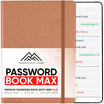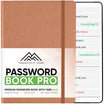The Importance of Secure Password Management
In an increasingly digital world, where we rely on countless online platforms and services, managing passwords effectively is of paramount importance. While it may be tempting to use simple, memorable passwords or reuse them across multiple accounts, these practices compromise our online security. To address this issue, password books have emerged as a popular solution, enabling individuals to securely store and organize their passwords. In this comprehensive guide, we will explore the concept of password books, their benefits, and how they contribute to overall productivity.
Understanding Password Books: An Overview
Password books are physical or digital tools that provide a systematic approach to managing passwords. They serve as a secure repository for storing login credentials, allowing individuals to easily access their accounts while maintaining strong password practices. By centralizing password storage, users can avoid the risk of forgetting or misplacing their credentials, as well as the temptation to resort to weak passwords for the sake of convenience.
The Evolution of Password Books
Password books have evolved significantly over time. Initially, they were simple notebooks or diaries where individuals would manually write down their passwords. Today, password books come in various formats, including dedicated password management software and encrypted online platforms. These advancements have enhanced the security and convenience of password management.
The Benefits of Using Password Books
Using password books offers several advantages for individuals seeking to maintain secure online practices and boost productivity. Let's explore some of the key benefits:
1 Efficient Password Organization: Password books provide a structured system for organizing passwords. They often include predefined fields for website URLs, usernames, and passwords, simplifying the retrieval process.
2 Enhanced Security: By utilizing password books, users can generate strong, unique passwords for each account without the need to memorize them. This reduces the risk of password breaches and unauthorized access.
3 Convenience and Accessibility: Password books offer easy access to login credentials, whether in physical or digital form. With password management software or online platforms, users can access their passwords from any device with internet connectivity.
4 Time-Saving: With password books, the time spent on password retrieval is significantly reduced. Instead of relying on memory or resetting passwords, individuals can quickly locate the required information and access their accounts effortlessly.
5 Peace of Mind: Knowing that passwords are securely stored and easily retrievable provides peace of mind. Users can focus on their tasks without the worry of forgetting or losing access to their accounts.
Understanding Password Books: Frequently Asked Questions (FAQs)
FAQ 1: What types of password books are available?
There are various types of password books available to cater to different preferences and needs. Some common types include:
1 Physical Password Books: These are physical notebooks or diaries specifically designed for storing passwords. They often come with alphabetical tabs or sections for easy organization.
2 Password Management Software: These are digital applications that store passwords securely on your computer or mobile device. Examples include LastPass, Dashlane, and KeePass.
3 Online Password Managers: These are web-based platforms that store passwords in the cloud. They offer convenience and accessibility across multiple devices. Examples include 1Password and Bitwarden.
FAQ 2: How can I ensure the security of my password book?
To ensure the security of your password book, follow these best practices:
1 Choose a Strong Master Password: Your master password should be unique, complex, and not easily guessable. Avoid using personal information or common phrases.
2 Enable Two-Factor Authentication: If available, enable two-factor authentication for an extra layer of security. This typically involves receiving a verification code on your mobile device.
3 Keep Software Up to Date: If you're using password management software or online platforms, ensure that you regularly update the software to benefit from the latest security patches.
4 Use Encryption: If you opt for digital password management, choose software or platforms that offer encryption to protect your passwords from unauthorized access.
FAQ 3: Can I trust online password managers with my sensitive information?
While online password managers are designed with security in mind, it's essential to choose reputable and trusted platforms. Look for platforms that employ strong encryption methods, have a solid track record of security, and regularly update their security measures.
FAQ 4: What happens if I lose my password book or forget my master password?
Losing a physical password book can be risky, as it may provide unauthorized access to your accounts. If you forget your master password for digital password management, the recovery process varies depending on the platform. Some platforms offer account recovery options, while others may have stricter security measures in place. It's important to familiarize yourself with the recovery procedures and keep backups of your password information.
FAQ 5: Are password books suitable for business or team use?
Password books can be suitable for business or team use, depending on the specific requirements. For collaborative password management, consider using password management software or online platforms that offer features such as sharing passwords securely with team members and controlling access levels.
FAQ 6: Are password books legal and compliant with data protection regulations?
The legality and compliance of password books depend on the specific data protection regulations of your jurisdiction. It's important to research and understand the regulations applicable to your region. Additionally, choose password management solutions that adhere to industry standards and compliance requirements, such as GDPR (General Data Protection Regulation) for users in the European Union.
Conclusion
In conclusion, understanding password books is essential for effective and secure password management in today's digital landscape. By utilizing password books, individuals can enhance their online security, streamline password retrieval, and improve overall productivity. Whether you choose physical password books or digital password management solutions, the key is to prioritize strong passwords, employ encryption and two-factor authentication where possible, and stay informed about best practices in password security.























Leave a comment
All comments are moderated before being published.
This site is protected by hCaptcha and the hCaptcha Privacy Policy and Terms of Service apply.